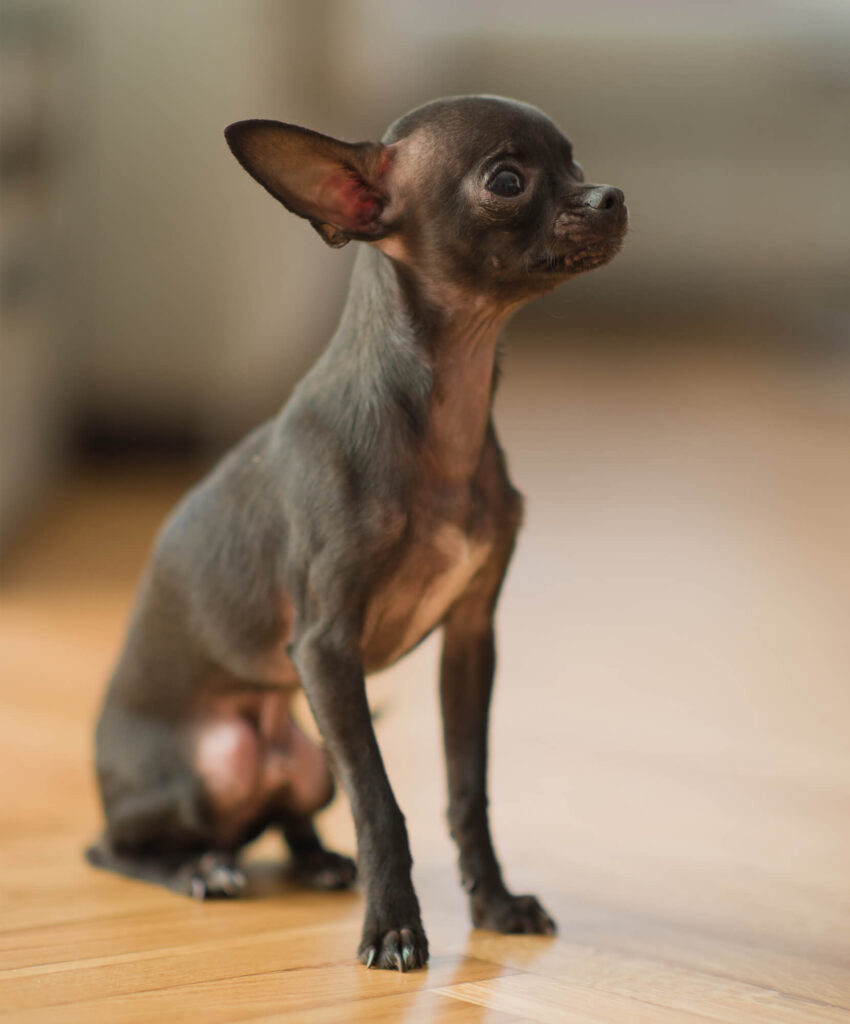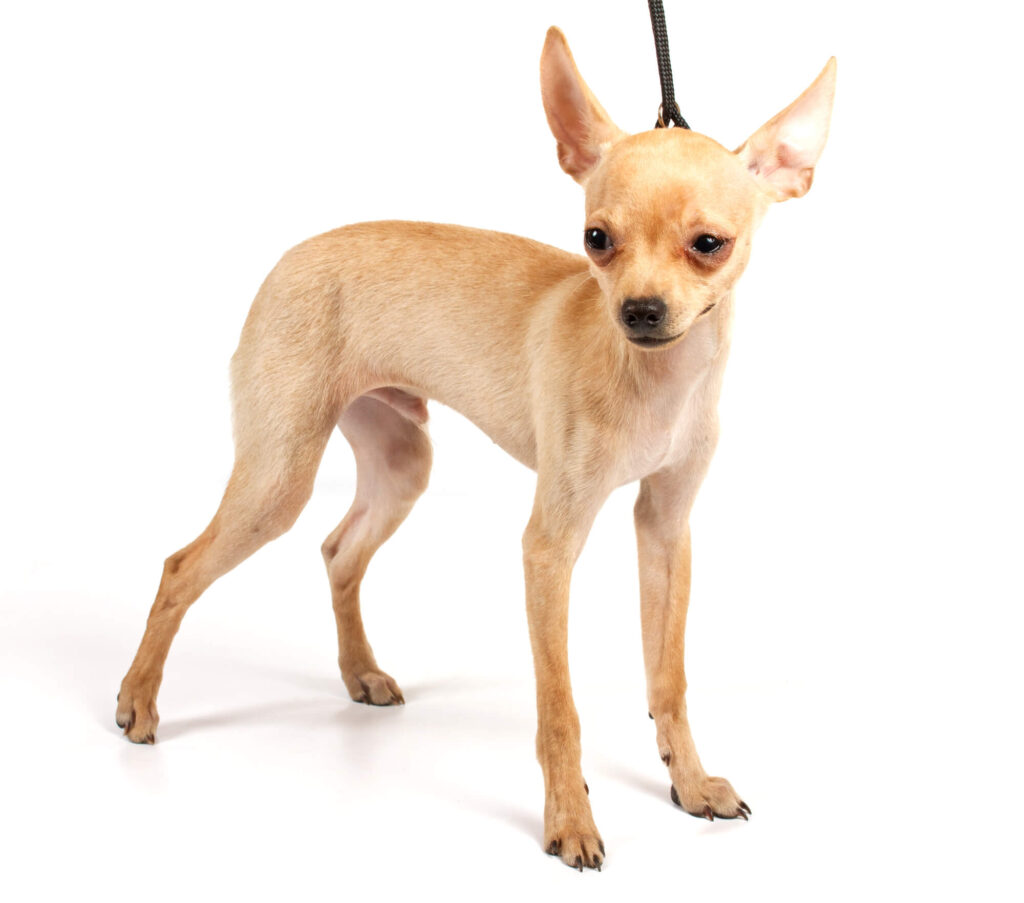Why Is My Chihuahua So Skinny? 7 Tips to Gain Weight
If you’ve ever wondered, “Why is my Chihuahua so skinny?” you’re not alone.
While some Chihuahuas are naturally slender, excessive skinniness may indicate underlying issues that require attention.
It can be concerning to see your pup losing weight or looking skinnier than usual.
Let’s explore 11 potential causes behind your Chihuahua’s skinny appearance.
We’ve also compiled 7 practical tips to help your Chihuahua gain weight.

11 Reasons Why Your Chihuahua Might Be Too Skinny
If you’ve noticed that your Chihuahua is looking a little too skinny, there could be a number of reasons why.
1. Picky Eater
Picky eating can lead to a skinny Chihuahua primarily because of reduced calorie intake.
If you have a picky eater who consistently refuses to eat enough food, they may not be consuming the necessary calories to maintain a healthy weight.
Over time, the calorie deficit can lead to weight loss and a skinny appearance.
Picky eaters may also miss out on essential nutrients, vitamins, and minerals necessary for their overall health and well-being.

2. Increased Activity
If your Chihuahua has become more active, they may be burning more calories than they are taking in.
This could be a result of changes in their exercise routine, such as longer walks or more frequent play sessions.
As a result, their calorie expenditure may surpass their intake, leading to weight loss and a skinny appearance.
While physical activity is essential for a Chihuahua’s overall health, it’s equally vital to ensure they consume enough calories to support their active lifestyle.
3. Parasitic Infections
Parasitic infections, such as worms, can have a significant impact on your Chihuahua’s weight, leading to weight loss and a skinny appearance.
These parasites can interfere with their ability to absorb essential nutrients from their food, depriving them of the necessary sustenance for proper growth and maintenance.
If you notice signs of a parasitic infection, such as changes in appetite, diarrhea, or a potbellied appearance, it’s essential to take your Chihuahua to the vet for a fecal test.
4. Dental Issues
Another reason your Chihuahua is skinny could be due to dental problems such as dental decay, gum disease, or tooth pain, which can make it difficult for your Chihuahua to eat.
Discomfort while eating can lead to reduced food intake, and over time, this can result in weight loss.
Your Chihuahua might avoid hard or crunchy foods, leading to a limited diet and inadequate calorie intake.
If your dog is experiencing dental issues, it’s crucial to have their teeth evaluated by a veterinarian.
5. Digestive Disorders
Digestive disorders such as inflammatory bowel disease (IBD) can have a significant impact on your Chihuahua’s weight.
These disorders can interfere with the proper absorption of nutrients from the food they consume.
Malabsorption and maldigestion are two conditions in which your Chihuahua’s body is unable to properly absorb or digest nutrients from their food.
This can lead to weight loss, as their body is not able to make proper use of the calories and nutrients they are consuming.
6. Endocrine Disorders
Endocrine disorders such as diabetes, kidney disease, and thyroid problems can disrupt a dog’s hormonal balance, affecting their metabolism and nutrient absorption.
EPI, exocrine pancreatic insufficiency, occurs when their pancreas does not produce enough digestive enzymes, leading to improper food digestion, which can also contribute to weight loss in Chihuahuas.
When endocrine disorders are present, your Chihuahua’s body may not effectively utilize their food’s nutrients, causing calorie deficits and weight loss.
Monitor your pet’s weight and look out for other symptoms such as increased thirst, frequent urination, or changes in appetite, which might indicate an underlying endocrine issue.
7. Old Age
As Chihuahuas age, their metabolism naturally tends to slow down, meaning they need fewer calories to maintain their weight.
However, some older dogs may face additional challenges.
They might become uninterested in food or experience a loss of appetite, leading to reduced calorie intake and further contributing to weight loss.
High-quality, senior-specific dog food may provide essential nutrients tailored to their aging needs.
8. Cancer
Cancer can cause your Chihuahua to look skinny.
When cancer is present, it can disrupt the normal functioning of their body, including the ability to absorb essential nutrients from the food they consume.
As cancer progresses, it can cause changes in metabolism and affect the digestive system, leading to reduced nutrient absorption.
This can result in insufficient calorie intake, leading to weight loss in your Chihuahua.
If you notice unexplained weight loss or other concerning symptoms in your pet, it’s crucial to seek veterinary attention promptly.
9. Inadequate Nutrition
If your Chihuahua is not getting enough of the proper nutrients from their food, they may be losing weight as a result.
This can be common in dogs that are fed a homemade diet, as it can be difficult to ensure that they are getting all the nutrients they need.
Some low-quality kibble products may lack the proper balance of essential nutrients, leaving your Chihuahua deprived of vital elements needed for their health.

10. Very High Metabolism
Chihuahuas, being small in size, already have naturally high metabolisms, but it seems like some types of Chihuahuas possess an even higher metabolic rate than others.
This means that they burn calories quickly and may struggle to maintain a healthy weight.
The combination of their small size and naturally high metabolism can make it challenging for these Chihuahuas to retain sufficient body weight and will require more calories.
11. Stress and Anxiety
Stress and anxiety can potentially lead to weight loss.
When your furry friend experiences stress or anxiety, it can disrupt their normal eating patterns, affecting their appetite and digestion.
In moments of stress, such as being in fight or flight mode or experiencing separation anxiety, eating is the last thing on their mind.
Their body’s natural response to stress is to prioritize survival instincts.
For dogs to eat comfortably, they need to feel safe, secure, and calm.
How to Tell If Your Chihuahua Is Too Skinny?
If you’re concerned that your Chihuahua might be too skinny, there are a few signs you can look for to determine if your dog is underweight.
Chihuahuas typically weigh between 3 and 6 pounds, but you need to take their height into consideration, too.
Visible Ribs
If you can see your Chihuahua’s ribs without feeling them, this is a sign that your dog is underweight.
While it’s normal to be able to feel your dog’s ribs when you touch them, they should not be clearly visible.
Visible Hip Bones and Shoulder Blades
When observing your Chihuahua from behind, you should not see their hip bones or shoulder blades sticking out prominently.
If these bones are easily visible, it may indicate that they are too skinny.
Lethargy
If your Chihuahua appears lethargic and lacks energy, it could be a sign that they are not getting enough nutrients and are underweight.
Reduced activity and enthusiasm for playtime can be indicators of being too skinny.

Loss of Muscle Mass
If your Chihuahua has little to no muscles, this could be a sign that they are underweight.
A healthy Chihuahua should have a toned, muscular body.
Low Body Condition Score
To determine if your Chihuahua is underweight, you can also use a body condition score.
This is a system that helps you determine if your dog is at a healthy weight based on their body shape.
A healthy Chihuahua should have a body condition score of 3 out of 5 or 4-5 out of 9. If your dog scores lower than this, they are underweight.
It’s important to note that Chihuahuas are naturally small dogs, with a typical weight range of 3-6 pounds.
However, if your Chihuahua weighs less than 3 pounds, they are likely underweight and may need to see a veterinarian.
Problems of Being Underweight
If your Chihuahua is underweight, it can lead to various health problems. Here are some of the issues that can arise due to your dog’s low body weight.

Heart Issues
If your Chihuahua is underweight, it can put more strain on their heart.
A dog’s heart has to work harder to pump blood through a body that lacks fat and muscle.
This can lead to heart disease, which can cause your dog to become lethargic, cough, and have difficulty breathing.
Diabetes
Underweight Chihuahuas are at a higher risk of developing diabetes. Insufficient fat in the body can lead to inadequate insulin production, causing hyperglycemia (high blood sugar).
Over time, consistently high blood sugar levels can cause damage to organs and tissues, potentially affecting the kidneys, eyes, nerves, and cardiovascular system.
Muscle Wasting
When a dog lacks the necessary body weight and nutrients, their muscles may begin to deteriorate, leading to a condition known as muscle wasting.
As a result, the dog’s muscles become weaker and less functional, impacting their overall strength and mobility.
Muscle wasting can make the dog feel lethargic and fatigued, affecting their ability to engage in physical activities and play.
Weak Immune System
When a dog is underweight or not receiving adequate nutrition, their immune system may become compromised, leaving them more susceptible to diseases and infections like pneumonia.
In malnourished dogs, the lack of essential nutrients, vitamins, and minerals can hinder the production of immune cells and antibodies, weakening the body’s ability to fight off infections.
Bone Health Issues
Underweight Chihuahuas may experience difficulty in supporting their body weight, which can further stress their bones and joints.
Dogs that lack essential fat and muscle are more prone to fractures and injuries.
Jumping or landing from heights can be particularly problematic, increasing the risk of fractures and joint injuries.
Additionally, underweight dogs may have weaker bones, which can lead to conditions like osteoporosis.
Cold Intolerance
Underweight Chihuahuas will be more sensitive to cold weather.
Due to their insufficient body fat, these dogs lack the natural insulation needed to regulate body temperature in colder weather.
Chihuahuas are generally not well-suited to cold climates, and being underweight exacerbates their sensitivity to low temperatures.
They may shiver or exhibit signs of discomfort when exposed to cold environments.
Without enough body fat to provide insulation, their bodies struggle to retain heat, making them vulnerable to temperature-related issues.
In such cases, it is important to provide them with appropriate clothing to keep warm.
Skin and Coat Problems
Inadequate nutrition can lead to a dull coat, dry flaky skin, excess shedding, and increased susceptibility to skin issues.
Underweight Chihuahuas may experience hair loss or thinning fur due to nutrient deficiencies, particularly those related to protein and vitamins.
How Can I Help My Chihuahua Gain Weight?
If your Chihuahua is too skinny, it can be concerning. Here are 7 tips to help your furry friend gain weight.
1. Choose a High-Quality Food
One of the most important things you can do to help your Chihuahua gain weight is to choose high-quality food.
Look for a food that has a high protein content and is made with real meat.
Avoid foods that have a lot of fillers or by-products.

2. Make Food Exciting
If your Chihuahua is a picky eater, you may need to make their food more exciting.
Consider adding toppers or fresh food to their meals.
You can try adding some cooked chicken or beef, or even some canned pumpkin or sweet potato.
This can help entice your Chihuahua to eat more.
Some Chihuahuas may prefer wet food or cooked fresh food like Farmer’s Dog.
3. Increase Caloric Intake
If your Chihuahua needs to gain weight, you may need to increase their calories.
This can be done by feeding them more often or by increasing the portion size of their meals.
However, be careful not to overfeed them, as this can lead to other health problems.
4. Deworm
If your Chihuahua is too skinny, it’s possible that they have parasites, which lead to poor weight gain and overall health problems.
A vet will be able to perform a stool test to check for any worms or eggs and recommend appropriate treatment.
5. Check For Injuries and Health Problems
If your Chihuahua has lost weight suddenly or has difficulty gaining weight, it could be a sign of an underlying health issue or injury.
Parasites, dental or gastrointestinal problems, or endocrine disorders can all contribute to a skinny Chihuahua.
Signs of injury or pain can include limping, aggression, shaking, excessive licking, restlessness, and excessive vocalization.
Make sure to have your Chihuahua checked by a veterinarian to rule out any underlying health problems.
6. Regular Vet Checkups
If you’re having trouble getting your Chihuahua to gain weight, it’s a good idea to consult with a veterinarian and keep up on regular vet checkups.
They can help you determine the underlying cause of your Chihuahua’s weight loss and provide you with a treatment plan.
7. Consider Supplements
Finally, if your Chihuahua needs to gain weight, you may need to add some supplements to their diet.
Consult with your veterinarian before introducing any supplements, but they may recommend adding omega-3 fatty acids or other nutritional supplements to enhance your Chihuahua’s diet and promote weight gain.
Supplements such as probiotics and digestive enzymes can help improve your Chihuahua’s digestion and nutrient absorption.
Summary
Now you have your answer to “why is my Chihuahua so skinny?”
It is important to identify the underlying cause of your Chihuahua’s weight loss and take appropriate measures to help them gain weight in a healthy manner.
If you are concerned about your Chihuahua’s weight loss, it is important to consult with a veterinarian to rule out any underlying health issues and develop a personalized treatment plan for your furry friend.
FAQs
How Many Times a Day Should You Feed a Chihuahua?
You should feed your Chihuahua two to four times a day. Chihuahuas have small stomachs and high metabolism, making it necessary to provide them with regular, smaller meals throughout the day to keep their blood sugar steady.
Sticking to a consistent feeding schedule and not overfeeding your dog is important.
What Is the Ideal Weight for a Chihuahua?
The ideal weight for a typical Chihuahua is between 3 and 6 pounds. The ideal weight for a Chihuahua can vary depending on their age, sex, and individual body structure.
Calculate your dog’s BMI here to determine if they are at a healthy weight.
Why is My Dog So Skinny Even Though She Eats A Lot?
It’s possible that your dog has an underlying health condition such as thyroid problems, parasites, or gastrointestinal issues that is affecting their weight.
Other factors such as stress, poor quality food, or increased exercise could also contribute to weight loss.
It’s important to consult with your veterinarian to determine the cause and develop a plan to help your dog gain weight in a healthy way.
How Do I Tell If My Chihuahua Is Overweight?
You can tell if your Chihuahua is overweight by feeling their ribs. If you can’t feel their ribs easily, your dog may be overweight.
Another sign of being overweight is if their waistline is not visible or if they have a round, bulging belly. If your Chihuahua seems to have difficulty moving around or tires easily during exercise, they may be carrying extra weight.
Overweight Chihuahuas may also have difficulty breathing or may snore while sleeping.
Why Is My Dog So Skinny After Giving Birth?
It’s common for dogs to lose weight after giving birth, especially if they are nursing puppies. Nursing puppies require a lot of energy, and your dog’s body may be using up more calories than she is taking in which can cause weight loss.
The birthing process and caring for newborn puppies can be physically and emotionally stressful for the mother dog. Stress and hormonal changes can impact her appetite and contribute to weight loss.
If your dog is excessively skinny or seems to be losing weight rapidly, it’s important to consult with your vet.
Related posts:
- How Much Walking Does a Chihuahua Need? [Exercise Guide]
- 7 Types of Chihuahuas: Full Guide With Pictures
- Is It Safe to Leave a Chihuahua Home Alone? Challenges + Solutions
- Do Chihuahuas Shed a Lot? (23 Useful Tips to Minimize Shedding)
- 8 Best Chews for Chihuahuas (Natural & Healthy)
- How Big is a Chihuahua’s Stomach? (Stomach Issues + 8 Tips)



![How Fast Can a Chihuahua Run? [26 Chihuahua Running Tips]](https://thechihuahuashack.com/wp-content/uploads/2022/06/how-fast-can-a-chihuahua-run-1-768x513.jpg)


